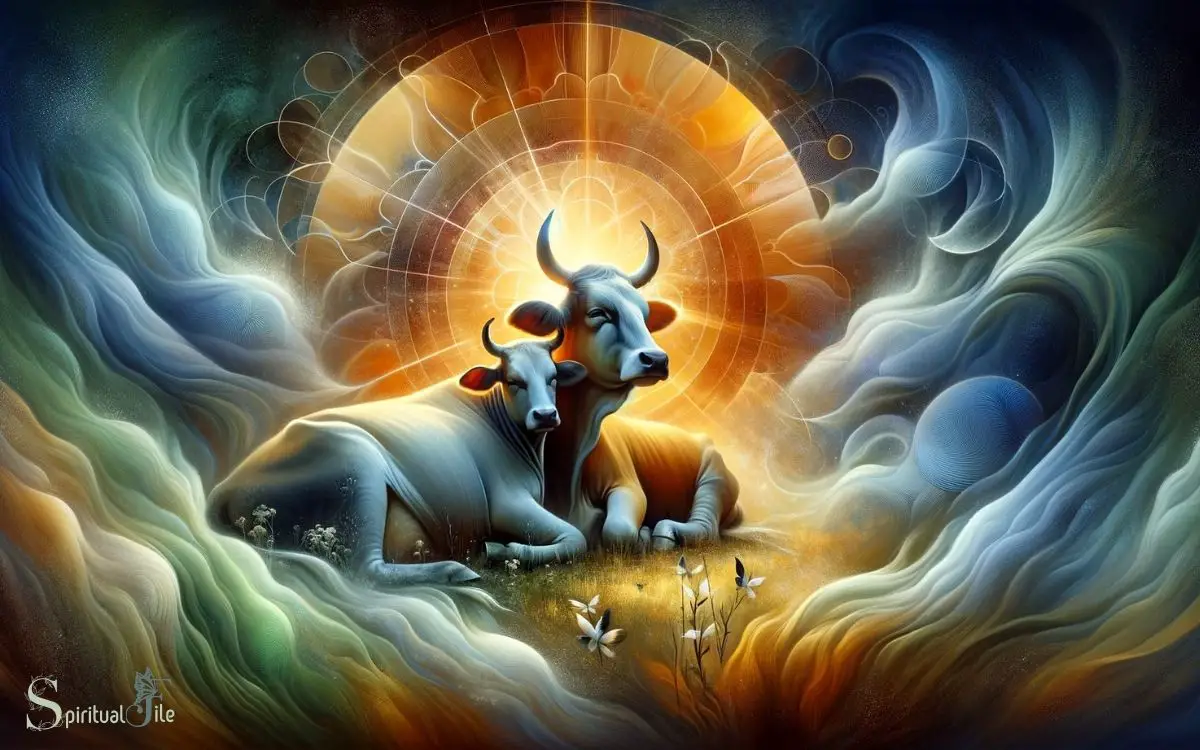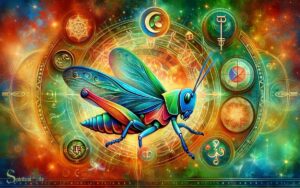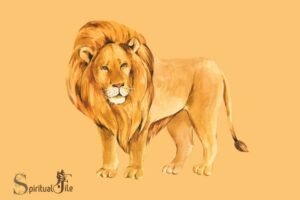What Do Cows Represent Spiritually? Motherhood!
Cows represent spirituality through their symbolism of abundance, motherhood, nurturing, and life-giving qualities.
In many cultures and religions, cows have been considered sacred, embodying spiritual symbolism. They often represent aspects of life and spirituality that are valued in various belief systems, such as abundance, fertility, and nurturing qualities.
Cows also symbolize the connection between humans and nature, reminding us of the importance of living in harmony with our environment.
Cows hold a sacred status in numerous cultures like Hinduism, where they are revered as a symbol of life and abundance.
In ancient Egyptian mythology, the cow goddess Hathor portrayed motherhood and fertility. Cows also symbolize the bond between humans and nature, as they provide nourishment and sustenance, reminding us of the importance of living in harmony with the natural world.

Key Takeaway
6 Spiritual Representations of Cows in Various Cultures
| Culture/Religion | Spiritual Representation | Explanation |
|---|---|---|
| Hinduism | Sacred animal | In Hinduism, the cow is considered a sacred animal and is revered since it provides life-sustaining substances like milk, ghee, and yogurt. It is also associated with Kamadhenu, the divine wish-fulfilling cow. |
| Buddhism | Symbol of patience and compassion | Cows are thought to represent patience and compassion in Buddhism since they are gentle and provide nourishment to humans. |
| Zoroastrianism | Symbol of wealth and prosperity | In ancient Zoroastrianism, the cow was considered a symbol of wealth and prosperity, as it represented abundance and fertility. |
| Ancient Egypt | Symbol of fertility and nurture | The cow goddess, Hathor, was revered as a mother and a nurturer, representing the traits of fertility and maternity. |
| Celtic culture | Symbol of motherhood and nourishment | In Celtic mythology, the cow was considered a symbol of motherhood and nourishment, often associated with goddesses like Brigid. |
| Norse mythology | Creation and nurturing | In Norse mythology, the cow, Audumbla, is responsible for creating the first beings. She represents nurturing and sustenance. |
Cows as Symbols of Nurturing and Maternal Instincts
As an important symbol in many spiritual traditions, cows embody nurturing and maternal instincts. In Hinduism, the cow is revered as a maternal figure, representing the divine mother providing nourishment and sustenance.
This symbolism is also reflected in Buddhism, where the cow is seen as a symbol of nurturing and gentle strength. Even in ancient Egyptian mythology, the cow was associated with the maternal goddess Hathor, representing fertility, motherhood, and love.
The gentle and nurturing nature of cows has led them to be seen as a source of comfort and sustenance throughout various cultures and spiritual beliefs.
This maternal symbolism extends beyond the physical realm, representing the caring and protective aspects of the divine. Transitioning into the subsequent section, it’s important to explore how cows also represent fertility and abundance.
Cows Representing Fertility and Abundance
In my view, cows embody a significant symbol of fertility and abundance in spiritual beliefs, reflecting their nurturing and maternal nature. They are revered for their association with fertility and abundance in many cultures and spiritual traditions.
Here are some reasons why cows are seen as representing fertility and abundance:
- Milk production: Cows are known for their ability to produce nourishing milk, symbolizing fertility and sustenance.
- Reproduction: Their natural ability to reproduce and give birth to calves is often seen as a symbol of fertility and abundance.
- Connection to Earth: Cows’ close connection to the earth and their role in sustaining life through providing milk and meat symbolize abundance.
- Nurturing behavior: The gentle and nurturing behavior of cows towards their calves is seen as an embodiment of fertility and abundance.
- Role in agriculture: Cows’ contribution to agriculture and their association with bountiful harvests symbolize abundance and prosperity.
The Sacredness of Cows in Hinduism
Having discussed the representation of cows as symbols of fertility and abundance, I find it important to delve into the sacredness of cows in Hinduism. In Hinduism, the cow is revered as a symbol of divine and natural beneficence.
It is considered to embody various qualities such as non-violence, selflessness, and the ability to provide for others. The sacredness of cows is deeply rooted in the Vedic scriptures and is reflected in various rituals, prayers, and festivals.
Cows are believed to be the embodiment of the earth and the care and protection of cows are considered a sacred duty. Their milk, dung, and even urine are used in religious ceremonies and are believed to have purifying properties.
This reverence for cows reflects the interconnectedness of all life and the importance of compassion and sustainability.
Transitioning into the subsequent section about ‘cows as symbols of prosperity and wealth’, it is essential to understand how this sacredness intertwines with the spiritual and material aspects of life.
Cows as Symbols of Prosperity and Wealth
The sacredness of cows in Hinduism extends to their representation as symbols of prosperity and wealth. In Hindu culture, the cow is highly revered for its association with goddess Lakshmi, the deity of wealth and prosperity.
The significance of cows as symbols of abundance and affluence is deeply rooted in the spiritual and cultural beliefs of Hinduism.
Here are some reasons why cows are seen as representations of prosperity and wealth:
- Cows provide dairy products and are a source of nutrition
- They are considered as a form of currency and wealth in rural agricultural communities
- Owning cows signifies financial stability and abundance
- Cows are believed to bring good fortune and blessings to households
- In Hindu rituals and ceremonies, the gifting of cows is considered auspicious and a symbol of prosperity.
Cows in Ancient Egyptian Spirituality
I can’t wait to explore the significance of cows in ancient Egyptian spirituality. These sacred animals were deeply intertwined with the religious beliefs and practices of ancient Egyptians.
From being revered as sacred symbols to their association with goddess worship and beliefs about the afterlife, cows held a prominent place in the spiritual framework of ancient Egypt.
Cows as Sacred Symbols
In ancient Egyptian spirituality, cows held a sacred significance as symbols of fertility and maternal nourishment. They were revered as embodiments of the divine feminine and were associated with several goddesses, such as Hathor and Isis.
The symbolism of cows in ancient Egyptian spirituality can be understood through the following points:
- Cows were seen as nurturing and protective mothers.
- They represented the bountiful and life-giving powers of the natural world.
- Cows were linked to the concept of regeneration and the cycle of life.
- Their milk was considered a symbol of sustenance and abundance.
- Cows were often depicted alongside deities, highlighting their esteemed status in religious iconography.
The veneration of cows as sacred symbols reflects the deep reverence for maternal and life-giving forces in ancient Egyptian culture.
This understanding lays the foundation for exploring the worship of cow-headed goddesses in ancient Egyptian spirituality.
Cow-Headed Goddess Worship
Exploring ancient Egyptian spirituality reveals the significance of cow-headed goddess worship as an integral aspect of their religious practices. The cow-headed goddess Hathor was highly revered in ancient Egypt.
She was associated with motherhood, fertility, and the nurturing aspects of femininity. Depicted as a woman with the head of a cow or as a complete cow, Hathor was considered the protective and benevolent mother of the pharaoh and the people.
Her representation symbolized the caring and nurturing nature that was essential for sustaining life. The ancient Egyptians believed that through her divine presence, they would receive blessings of abundance, prosperity, and protection.
The worship of the cow-headed goddess reflects the deep spiritual connection that the ancient Egyptians had with the nurturing and life-giving qualities symbolized by the cow.
Cows and Afterlife Beliefs
Continuing from the previous subtopic, the significance of cows in ancient Egyptian spirituality extends to their beliefs about the afterlife. In ancient Egyptian culture, cows were deeply intertwined with their beliefs about the afterlife.
Here’s how they were connected:
- Cows were considered as symbols of fertility and rebirth, playing a crucial role in the afterlife rituals.
- The goddess Hathor, often depicted as a cow, was believed to guide the deceased to the afterlife, emphasizing the cow’s association with transition and rebirth.
- Cows were also connected to the concept of nourishment in the afterlife, representing the provision of sustenance and abundance in the next realm.
- The ancient Egyptians believed that the cow’s nurturing nature in life extended into the afterlife, ensuring the well-being of the departed.
- The veneration of cows in ancient Egyptian spirituality highlighted the enduring significance of these animals in their beliefs about the afterlife.
This deep spiritual association with cows in the afterlife showcases the profound reverence the ancient Egyptians held for these gentle creatures.
Moving forward, let’s delve into how cows are seen as representations of gentleness and peace.
Cows as Representations of Gentleness and Peace
As we explore the spiritual significance of cows, it becomes clear that they are often seen as symbols of gentleness and peace.
Their tranquil nature and calm demeanor have led many cultures to view them as embodiments of spiritual peace. This representation of peace and tranquility is deeply ingrained in the symbolism of cows and holds significant spiritual value.
Symbol of Tranquility
Cows embody tranquility, representing gentleness and peace in spiritual symbolism. They serve as a powerful symbol of tranquility in many cultures and belief systems.
Here are a few reasons why:
- Gentle Nature: Cows are known for their calm and docile nature, which is often associated with the idea of tranquility.
- Peaceful Grazing: The peaceful act of cows grazing in a serene environment is a visual representation of tranquility.
- Motherly Care: The nurturing and protective behavior of mother cows towards their calves symbolizes a peaceful and caring presence.
- Harmonious Herds: Cows living harmoniously in herds, without aggression or conflict, reflect the essence of peace and tranquility.
- Cultural Depictions: In various religious and spiritual traditions, cows are revered as symbols of peace and gentleness, further emphasizing their association with tranquility.
Gentle Nature Symbolism
After researching the spiritual significance of cows, I’ve found that their gentle nature serves as a powerful representation of peace and tranquility across various cultures and belief systems.
In Hinduism, cows are revered for their gentle and peaceful nature, symbolizing non-violence and nurturing qualities. Similarly, in Buddhism, the gentle nature of cows represents the compassionate and peaceful teachings of the Buddha.
Even in Western cultures, the image of cows grazing peacefully in meadows evokes a sense of serenity and harmony with nature. This universal symbolism of gentleness and peace associated with cows reminds us to embrace peaceful virtues in our lives and interactions with others.
Gentle Nature Symbolism
- Hinduism
- Buddhism
- Western Cultures
- Universal Symbolis
- Application in Life
Spiritual Peace Embodiment
In exploring the spiritual significance of cows, their embodiment of gentleness and peace resonates deeply across cultures and belief systems.
Cows symbolize spiritual peace in various ways, and their representation as gentle creatures reflects the following points:
- Cows are often associated with calmness and tranquility, serving as a reminder to approach life with a peaceful demeanor.
- Their nurturing nature and the act of providing milk signify a sense of maternal care and compassion.
- The gentle gaze of a cow is seen as a reflection of inner peace and contentment, encouraging individuals to seek harmony within themselves.
- In Hinduism, the cow is revered as a symbol of non-violence and a peaceful existence, influencing followers to practice compassion and kindness.
- Cows embody the essence of peaceful coexistence, emphasizing the importance of living harmoniously with others in the world.
Cows as Spiritual Connections to the Earth
Feeling a deep spiritual connection to the earth, I have often found cows to be grounding and nurturing beings.
Cows symbolize a profound connection to the earth and its abundance. They embody the concept of sustenance and the cycle of life, reminding us of our dependence on the earth’s resources.
Here’s a table to illustrate the spiritual connections of cows to the earth:
| Spiritual Connection | Meaning |
|---|---|
| Grounding | Cows remind us to stay connected to the earth, finding stability in its nurturing embrace. |
| Nurturing | They represent the earth’s ability to provide sustenance and nourishment for all beings. |
| Connection to Abundance | Cows symbolize the earth’s abundance and the interconnectedness of all life. |
Through their presence, cows invite us to recognize and honor our spiritual connection to the earth and all its inhabitants.
How Does the Spiritual Meaning of Buffalo Compare to the Spiritual Meaning of Cows?
The spiritual significance of buffaloes differs from the spiritual meaning of cows in various ways. Buffaloes are often associated with strength, abundance, and the sacredness of life. In contrast, cows are often seen as symbols of nurturing, fertility, and gentle maternal instincts. Both animals hold important spiritual roles in different cultures.
The Role of Cows in Native American Spirituality
Reflecting on the spiritual significance of cows, I find that in Native American spirituality, cows play a significant role in symbolizing the interconnectedness of all living beings and the sacred relationship with the earth.
Cows are revered for their role in providing sustenance and their gentle nature, which aligns with the Native American belief in living in harmony with nature. In Native American spirituality, cows are seen as a symbol of abundance and the interconnectedness of all life.
They are considered sacred animals that embody the qualities of nurturing, protection, and provision.
Additionally, cows are respected for their role in providing essential resources such as food, clothing, and tools, further emphasizing their significance in Native American spiritual traditions.
- Symbol of interconnectedness
- Representation of abundance
- Sacred qualities of nurturing and protection
- Provider of essential resources
- Revered for their role in living in harmony with nature
Conclusion
As I reflect on the spiritual significance of cows, it becomes clear that these gentle creatures offer a profound connection to nurturing, abundance, and peace.
They embody the earth’s fertility and the divine feminine energy. Just as the cow provides sustenance and support, it reminds us to nurture our own spiritual growth and cultivate a sense of peace within ourselves.
In this way, the cow serves as a sacred symbol of harmony and abundance in our spiritual journeys.






